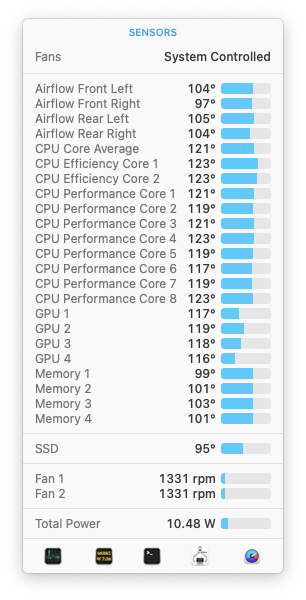UtterDisbelief
Moderator
- Joined
- Feb 13, 2012
- Messages
- 9,618
- Motherboard
- Gigabyte B760 Gaming X AX
- CPU
- i5-14600K
- Graphics
- RX 560
- Mac
- Classic Mac
- Mobile Phone
Good questions with more implications for hacks.
Its not as tidy as a the concern overcommitting system RAM.
Think how you've identified drive DRAM as a being cache the Mac's CPU to flash, then identify system RAM as a cache for the cloud to the Mac device in the same manner.
Everything Apple wants is for your Mac to be a way-station for rented services it connects via the network.
Every step of recent Apple device design has moved away from a PC-style unreliable bin-of-parts under the tyranny of the ruling OS to a more tightly integrated and reliable device package that provides an Apple customer a hookup to a tyranny of a ruling cloud service. Next up: AR/VR.
Where does the data sent to the drive come to / go from but RAM. That's where any data you immediately need to work on should be. So the question isn't how can the CPU help get data to the drive, but the other way around. To quote Sun-Ra "space is the place," or rather "RAM is the place." By closely integrating flash with RAM you can optimize the location of spatial-temporal layout of data to smooth the access to a dynamic cloud. Put another way, Apple thinks the last place you inter your data is on your device, they want to rent you a better version of yourself through their Colossus.
For this to work, device subsystems have to be very dependable, which is why the insides of Apple devices are soldered and glued together.
Ultimately, you will choose your device config by the scale and cost of your workload as it relates to cloud services, where if you require more data autonomy you will need a more powerful device, the cost of which will be justified by the value your peonage adds to Apple's hive.
As macOS becomes more tuned to Apples HW, it's OS optimizations are going to become more tailored to Apple's specific HW and less adaptable to "PCs". An NVMe drive is built according to a system layout assumption that privileges residency of data in local storage, but data in RAM is what should be privileged in a network node. Flash is just a local warehouse.
(Alan Kay argued that todays CPU design is weak because it over-emphasizes RAM as a warehouse at the expense of computing which is endlessly thwarted by caches, but he was looking — as was Alan Turing in his later work — at the elegance of the computational structure of life.)
Every hackintosher should becomr keenly aware that the Mac is truly not-a-PC, it's something that emerged from a history that had an major PC era which Apple has deftly parlayed as a stepping stone to a more profound system of market control. As to what this means for humanity, well so far these companies are more Dr. Evil than truly evil, but watch out for the banality of evil, it can surprise you!
Jobs will gloat over Gates in the grave. But it's the DoE / ARPA / Xerox PARC / SRI nerds that will rise in the Apocalypse when the accounting of the 9 Billion Names of God is complete.
For those who want to keep with their PC and maintain the freedom to truly invent: Linux, now more than ever.
As usual an intriguing overview. I always respect and appreciate your insights as an industry insider - at least I believe that's what you've hinted at being.
However your use of words like "tyranny" and "Colossus" and "Evil" give me a somewhat impolite vision of yourself as a crusading Knight, armoured and wielding a large blood-stained sword, bellowing at the enemy!
I don't think Apple is in any way evil, nor being tyrannical. We only have to compare them with all the other large tech companies and see that only incredible success at what they do makes Apple stand out more than any other. This in turn leads to "tall poppy" syndrome where everyone feels the need to take a pop at them.
I am a late-comer to the "cloud" methodology, previously being staunch in my belief that local storage is best. Paranoia I guess. But now I pay monthly for extra iCloud storage and services. Not a problem. I believe a lot of Pen-Testing crusaders have tried to poke their swords into online security and, in Apple's case, rarely given me cause to worry. Indeed I've lost more through stupid errors on my part or failing hard-drives. But I have no dark secrets anyway.
As for caches and memory-paging (does anyone even call it that any more?) I would love to learn more about how Apple makes such apparently insignificant machines, when compared with monster PCS, do so much in so little. A friend of mine who is a YouTube Creator swapped from a big PC to a base Mac Mini, and knocks-out high-quality videos with Final Cut Pro, amazed at how the little Apple machine is so much more efficient than his old hardware. He points out real-time editing without much of a lag. Yes, I understand words like "optimisation" and "walled-garden" but whatever the complaints - it works in real-world applications!

